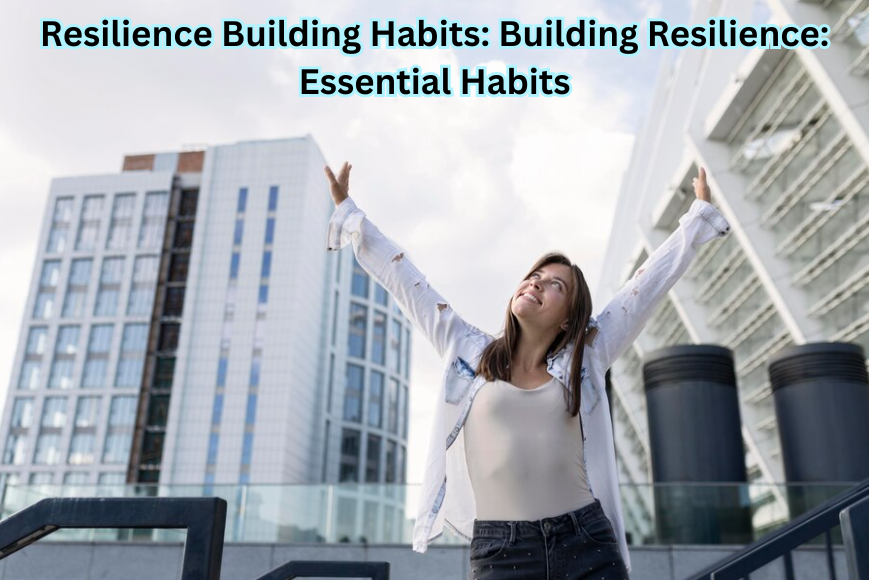Getting stronger is the key to living and thriving in life’s obstacles. Welcome to “Cultivating Resilience: Key Habits for Getting Stronger Inside.” We will examine how habits that make you more resilient can change your life and reveal the keys to improving your mental and emotional health. Come with us on a trip to find habits that will help you get through life’s storms and come out better and more resilient. Click here.
Understanding How to Build Resilience:
How to Get to the Heart of Building Resilience
Before we look at the habits, let us understand what building resilience is all about. Being resilient means getting back up after a setback, dealing with change, and facing difficulties head-on. Being resilient takes work. You must form habits that strengthen your mind and spirit and help you think about growth even when things go wrong.
Why resilience is important:
How to Handle Life’s Turns with Inner Strength
Being resilient is not just a survival skill but also a way to improve your health and well-being. More resilient people handle problems better and use them to learn more about themselves and grow. Realizing the importance of resilience sets the stage for making important habits a part of daily life.

Important Habits for Getting Stronger:
Introducing Daily Practices That Will Change Your Life
Now, let us talk about habits you can use immediately to help you become more resilient. Practicing these habits regularly builds a strong base that enables you to handle life’s uncertainties with grace and power.
A growth mindset is important to have.
The Power of Seeing Things Positively
A growth attitude is one of the most important habits for resilience. Think of problems as chances to learn and grow, and have faith in your ability to change and adapt. With a growth attitude, issues become stepping stones, which helps you be strong when things go wrong.
2. Show yourself kindness:
Taking Care of Your Inner Kindness
Being resilient starts with being kind to yourself. Be kind to yourself like you would treat a friend having a hard time. Recognize your thoughts without judging them, and start talking to yourself in a way that helps you. Self-compassion makes you emotionally strong so that you can deal with problems with a more stable and strong mind.
3. Set up healthy ways to deal with stress:
How to Deal with Stress in a Healthy Way
Learn how to deal with stress healthily. Being mindful, working out, or being artistic are all examples of positive reactions that can help you deal with problems well. Getting into these habits will give you strength and help you deal with issues coolly and collectedly.
4. Build strong relationships with other people:
Putting together a helpful group
Having strong social ties makes you more resilient. Build strong bonds with family, friends, and people in your neighborhood who can help you. Sharing your struggles and successes makes you feel like you belong and gives you important mental support, making you stronger when needed.
5. Be open to change and flexibility:
Thriving in the middle of change
Being resilient means being able to deal with change flexibly. Develop an attitude open to doubt and values being able to change. When you see change as a chance to grow, you build the strength to deal with life’s constantly changing environment.
6. Set Doable Goals:
Harnessing Progress with Achievable Targets
Setting goals that you can reach makes you more resilient. Break down big goals into smaller ones you can handle, and enjoy the little wins along the way. This habit makes you feel good about what you have done and gives you the strength to take on tasks one step at a time.
Keeping your resilience up over time:
This is the art of being consistently resilient.
Getting more resilient takes time and work. Let us talk about ways to keep up these habits and build lasting grit throughout our lives.
Think about things often:
How to Find Your Way to Personal Growth
Self-reflection regularly makes you stronger by showing you your skills and weaknesses. Take time to think about what you have been through, recognize the hard parts, and praise your strength. This habit encourages ongoing personal growth and builds mental toughness.
Get help from a professional:
Helping People Become More Resilient
Having the help of professionals makes you more resilient. If you need help, talk to a therapist, teacher, or guide. Their knowledge can help you see problems and find solutions, improving your ability to become and stay resilient.

Mark important steps toward resilience:
Recognizing Your Strength
Celebrate important steps on your path to recovery. Remember the times you overcame problems and came out stronger. Recognizing your inner strength makes you more resilient, which starts a good loop that moves you forward.
Conclusion
Developing grit is not a goal; it is a way of life. “Cultivating Resilience: Essential Habits for Building Inner Strength” is a book that encourages you to make habits that will change your life. Adopting a growth attitude, being kind to yourself, and finding healthy ways to deal with stress strengthen your resilience. When life throws you problems, these habits become lines of inner strength that help you keep a strong mind that lets you handle the tough parts of life with grace and strength. Accept the process of building grit and find the lasting power you already have.
FAQ:
Welcome to “Resilience Building Habits: Essential Habits for Building Inner Strength,” a book that will change your life. Want to make your mental strength stronger? This Frequently Asked Questions (FAQ) section unlocks the mysteries and gives you useful advice on how to form habits that will help you deal with problems and grow in them. Let us discuss common questions, clear up the mystery of being resilient, and find the key habits that will help you become stronger. Here’s a plan for how to turn problems into chances to grow.
What are the four parts of making someone resilient?
These are the four parts of building resilience:
Being self-aware means knowing your feelings, skills, and flaws.
Social support means building good relationships with other people to get mental support.
Problem-solving skills: coming up with good ways to deal with problems.
Adaptability means being open to change and being flexible when things go wrong.
What are the four ways to make yourself more resilient?
Here are four ways to make yourself more resilient:
Developing a growth attitude means seeing problems as chances to improve yourself.
Creating good ways to deal with stress: making positive reactions to it.
Making strong social connections: fostering relationships that help each other.
Setting realistic goals: To feel like you have accomplished something, break down your goals into steps that you can take.
What are the five C’s of being resilient?
These are the 5 C’s of resilience:
Competence means having faith in your skills and being able to change well.
Confidence means believing in your ability to handle problems.
Connection: Making and keeping close friends to get mental support.
Character: Developing a strong sense of right and wrong.
Contribution: Giving others and the community what you can gives you meaning.
What are the four R’s of being resilient?
These are the 4 R’s of resilience:
Recognize: Being aware of and naming one’s feelings and problems.
Refuel: Taking care of yourself and doing things that give you energy again.
Reflect: Give yourself time to think about your feelings and events.
Respond: Picking thoughtful answers to problems, which encourages flexible handling.

